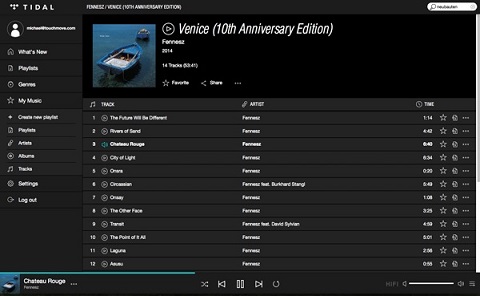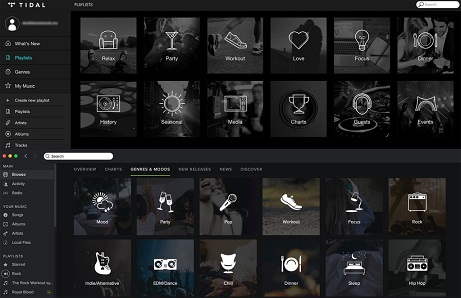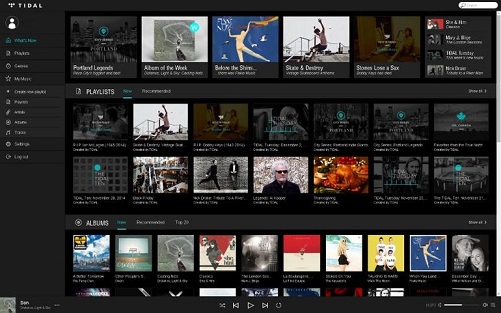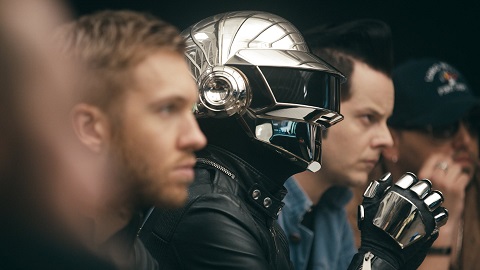TIDAL

Sea Changes
By Nathaniel Osborne
(April 2016)
It really was just a coincidence; a matter of being at the wrong place, wrong time. I'd had The Blueprint on repeat again for weeks, to start with. "The Takeover" and "Never Change": Jay-Z , forever both king and underdog, never really "selling out" because that's kind of the point; democratic mogul whose fanbase shares in his glow of success by imbuing his hopes with their faith. Not many people have pulled it off quite like Hov; to be an idol for so long and truly always represent, American Gangster or not.
In another (whiter) corner of my musical spectrum, I was getting increasingly desperate to find Common One- I mean, come on Pirate Bay, do I really need to download ALL of Van Morrison's discography just to get this one album?
Yes, because, as (I suspect) in much the same manner of most of my generation, I've never had much of a relationship to the physical album. Ever since, at nine or ten, I discovered the virtual equivalency between peer-to-peer sharing and, say, the standard iTunes download, it's felt almost dirty to me to spend ten dollars when it's just a few clicks away. Chalk it up to a moral failure of self-entitled consumerism, but that knowledge cast over actual purchase a certain masturbatory hue. Like the ineffectuality of a handout did my virtuous satisfaction give way to resentment and regret. Next time, better to save that not-so-disposable income for something more necessary, like gas money for that dead-end job, or cigarettes to fortify against the ennui. We're all doing what we can, right?
My involvement in the torrent "community" was always skin-deep. My know-how extended just barely to conversion of those inevitable, pesky FLAC files (perhaps why Neil Young's Pono never got me excited). File sharing is reliable for those multi-platinum new releases we're all weaned upon, but as my musical tastes "advanced" to more dimly-lit corners of obscurity, it become ever harder to find that ONE album which would put everything into place. So, to my credit, I've supplemented my piracy over the years (out of necessity) by at least hundreds of dollars' worth in downloads and mail orders. Beyond occasional inconvenience, however, I think that many "pirates" out there, myself included, feel over their actions occasional twinges of conscience, if not remorse, at least nostalgia for a time before the temptation of "theft" was afforded. Then, the plights of starving artists were more on account of duplicitous record labels than us. Now that the decision if ours, you aren't being a "supporter of the arts" if you're not being a good consumer. But isn't that really the way it's always been? Either way, no turning back.
Groping through such half-formed sentiments as these did I first espy #TIDALforALL1. This debut advertisement, mission statement, declaration of independence, came off more than anything as blockbuster movie trailer. Rather than giving us simple product description, or Jesus, at least something funny, Jay-Z chose to introduce his acquired company with a "Fuck You/Us Against the World" mentality. "The world" because who it was exactly that Tidal was up against wasn't exactly made clear. Record companies? Philistinism? Spotify? Pirates like me? None of these specifically, yet all. A group of superstar recording artists are viewed gathered around a table, discussing this coming "revolution." Kanye West, Rihanna, Chris Martin, Daft Punk, Jay-Z himself of course and many more, with those who couldn't make it being channeled in through Skype; it all added up to a millionaire gathering of Justice League proportions. The artists there represented, in a way, self-made successes taking control of their market. All present were musicians who, to differing degrees, had found success through the quality of their product and not record company hype and promotion. That's at least what they were going for, I believe. Also implicit, crucially, was that because of their artistic integrity they represented merely the apex of an entire industry that was about to be "saved." To Hov's credit, I truly believe that independent artists were implied in the benefits of that coming "rising tide." Tidal's made an effort to operate that way. But if no one found it obvious, then I suppose it wasn't obvious enough.

Image from Audiostream
Well, something broke inside; I saw the light, I had my "road to Emmaus" experience. "Nathan, Nathan, why dost thou persecute me?"2 cried the apparitions of my musical heroes and idols. Now, ready to repent, I fork over that monthly fee, and for the FIRST TIME bask in the possibilities of the entire world's music a moment's notice away. Yes, besides my latent desire to just be part of ANYTHING (helmed by Jay-Z doesn't hurt either), I'd never subscribed to streaming before and, as any honest Luddite will tell you, contrarianism, with all its joys, leaves one still with the occasional #FearOfMissingOut.
I'd been prejudiced against streaming ever since a friend's comment jolted me into the present back in 2010. Discussing out shared addiction to Kanye West, I asked which album he thought his greatest. Expecting the correct answer, Late Registration, I instead received "Oh, you're an album guy? I'm more of a song guy myself." Having shattered my critical worldview, he proceeded to inform me that Spotify was the way everyone got their music nowadays. The future was here, and to me, it looked dark. Singles, playlists, Top 40 mass-conformity –if the album was on the way out, what else of value was left? Spotify then represented the regressive tendency of industry "progress," and I was determined to stand athwart, yelling Stop.3
Besides history, streaming also fucks over artists, as everyone knows. If Tidal pays the artists double (per their $20 fee), which is still a bit unclear though plausible, the music industry will still be in a radically different place than the pre-Napster era (even if Tidal's higher royalties win out). In any case, the bad news remains: it's not enough. Let's suppose a hypothetical debut solo recording artist. If she's garnered two-thousand raving fans, each listening to the songs one hundred times a month, that'll mean about just enough money ($500) to pay for a studio apartment where I come from. Can you imagine thousands of fans replaying your songs at such a rate? I can't, but still, you couldn't quit your day job. Perhaps these issues can be better understood through a comparison with our own situations. Barring an unequivocal rave from Pitchfork, the next Kim Gordon is further away than me from accomplishing that privately urgent fight for $15.
Community college paid off big for me before even the first day of classes. A grainy photo of my upcoming schedule slashed the $20 for the "Hi-Fi" service in half, and thus into Spotify range. Accordingly I never had to deal with the higher price, apparently a chief complaint of the anti-Tidal faction. Whether or not I'd have continued with the higher price without the discount I can't say. My stereo/headphone setup has always been in such a dismal state that I doubt I'm hearing the full capabilities even of compressed MP3's. That being said, audiophilia is based to large degree on the idea of superiority. If I toggled the settings, and listened closely, I really think I could hear something.
Ninety-five percent of my Tidal use has been on an obsolete iPod model w/o data. Thus, my only available route was the offline capability, i.e. Hi-Fi album downloads. My biggest time for music is the "commutes" (too polite a term) between work, residence, and school. In that grey area between suburbs and the middle of nowhere, the average person does just as much driving as city-bound rat-racers. I average about eight hours a week (egad!), so I thought I'd have sufficient time to acquaint myself with "all the music in the universe."

Image from Created Digital Music
Around the time that I was just starting off, the media coverage of my new brand became inescapable. "Coverage" is really too polite a term; it was closer to a concerted industry-wide character assassination. Tidal elicited invective not only from media elites, but Joe the plumbers, porn stars, and angry male adolescents.4 The foremost complaint was the audacity of a 1%'er rap star requesting people's money for music, though Daniel Ek5 and Jay-Z's net worth's are virtually identical. Articles appeared daily along the lines of "TOP 10 REASONS WHY TIDAL WILL FAIL." Pundits hardly bothered to conceal their contempt and hostility projected upon this one individual. The rage had no discernible methods or scruples. Values and goals were confused and contradictory, with only a frenzied self-entitlement able to articulate itself, like the delirium tremens of some residual "Occupy" hangover. Warnings in the press of streaming's impact on the industry had been common for years; now, however, higher rates for artists, higher quality sound, competition in the marketplace were all to be sacrificed if only Tidal would burn with them. Railing against Hov, a charismatic "newcomer" in the streaming field (with comparable business practices to peers), and maligning him as power-hungry tyrant- the invective resembled Tea Party rabblerousing more than run-of-the-mill tech industry responses. While other rapper's business ventures receive adulation (or silence, at worst), Jay-Z seemed to have violated unspoken rules. Overpriced headphones cashing in on gangster chic are hailed as the "next big thing." The difference in reception may lie in the approach of the respective black front-men. Tidal wasn't "Tidal by Jay"; here Jay-Z was functioned as no mere mascot. It was an extension of his human capabilities into the business world. He asked to be viewed as an equal to the CEO's of comparable ventures. That censure would rain when stepping out of his corner attests to the consequences for African-Americans that would seek to move past implicit social norms. The role of stereotypes6 is apparently still a necessity for some black entertainers pursuing success in a world not fully their own. Perhaps the only thing that allowed Jay-Z such acclaim in the past were the regressive themes of Black Mafioso; the truly human element of his work, his oft-repeated rags-to-riches tale of redemption, has been from very nearly his beginning derided as old-hat and dull. Race, and the segregation of it, remains the "elephant in the room" in the entertainment industry. As much as we wish it was "only entertainment," or "just business," the phrases are, at their best, ideological blinders. In America, "colorblind" can only be a whitewash.
The roster of superstars with stakes in Tidal ensures exclusive content even the unconverted are going to want to listen to. With Jay-Z comes Beyoncé (obviously), Kanye, Rihanna, and record-label exiles such as Lil Wayne. With those five alone representing a sizable share of the entire music industry, one might presume that Tidal subscriptions would sell themselves. However, the trick will be for the exclusive content to be of such a quality that conversation over new releases must center around Tidal. For them to be successful, they'll have to retain those household names; new releases one day early are only appealing if they're that hot new thing you HAVE to listen to. Tidal's biggest success along these lines to date has undoubtedly been Rihanna's string of releases up to and including Anti. The video for "Bitch Better Have My Money" managed to become a brief cultural event unto itself. Tidal's unintentionally early release for Anti may turn out to be a blessing in disguise as well. Bizarrely trumping its leak to file-sharing platforms, Rihanna issued to fans free downloads of the album which included trials for Tidal along with it. Those free trials may sow the seeds for Tidal's lasting survival. Besides that exclusive content, Tidal remains by definition similar to other streaming services. Getting consumers not yet loyal to the competition into Tidal's door will be key to growing their user base. Their average time between major releases would suggest upcoming work by Jay, Bey, and Ye; as Tidal enters 2016/17, the ball would seem to be at last in its court. That means for Tidal, with eyes now forced upon it, the time has come for make or break.
I found myself, though initially drawn through merely personal concerns, a now-loyal consumer with my brand denounced and beleaguered. At any rate, I was ready to plunge into this unfamiliar technology with zeal.
I got that Van Morrison record, along with others I'd been languishing to acquire. Though not quite the "all music ever" I'd been expecting, the selections available were in context surprisingly exhaustive. But, discovering some curious absences, I discerned behind the hits-and-misses a whole world of veiled record-label politics and compromises. The most notable (and lapsed) streaming holdout to date has been Taylor Swift. Along with her example, the record labels entirely absent and discographies only partially available suggest an industry grappling with its own decline. With the fall of such giants as the Beatles, the battle seems to be nearing its end-game. Major labels and artists that are able to will continue to hold out in pockets, for a while. Smaller entities, out of idealism or desperation, will attempt to do the same, and they'll die out or survive according to the degree they can find a niche in the collapsing superstructure. Meanwhile, atop the mast of the sinking ship, the cipher of two remaining superstars rockets up the charts: WHAT A TIME TO BE ALIVE.

Image from Master Herald
My brain seemed pre-wired for the overwhelming immediacy of streaming's access. My infatuation with Van had me breezing through the best-of of what from his catalogue was there. Now, at the first mention of some promising blip on the indie radar, I could zoom right in and find out whether or not it was really worth my time. What's more, only five characters in a search bar away was all that stuff I'd wanted to get around to but never found time for. Both tool for research and purveyor of triviality, my care rides now were never dull. If they would have been, however, it would only have been for my own want of imagination. I quickly reached the storage limit on my iPod. Following this, I came to divide albums into three categories: ones I'd listen to right away (keep!), ones I'd really like to listen to but next (keep), and ones I really should listen to, but just at some future date (transferred to offline-only favorites). That enormous selection was as much a responsibility as it was a help. I could research out entire genres or time periods. Or, I could tune in, drop out on some expertly-programmed playlists for relaxation or amore. Tidal doesn't care what route you choose. Once you've paid the fee, how you spend your time in Paradise is up to you.
I found myself experimenting with wildly disparate genres, testing their effects afterwards on my behavior at my work. When you think about it, after a while what else really is there to do? Finally embarking in that manner on the journey through twentieth century classical, though, was a mistake. I didn't quite wither like the plants in those experiments. I can attest, though, that Schoenberg, played at high enough decibels, can make it extremely difficult to play the part of well-adapted human being. Shortened breath, facial tics, dilated pupils – what that shit can do to you makes the most far-out acid rock of the sixties feel downright square.
Funhouse, though, which I'd lost my CD of years ago, still held its thrills. I revisited it one of those work-nights so slow the "OPEN" sign seems merely a desperate plea towards the customer's later weekend predilections. I staggered through the door giddily, and damn straight did I FEEL ALRIGHT. With those first three sax notes on repeat in my head, I listen to K. laughing with another of my co-workers. K. (I really can just never spell her name right) was telling how she'd sung some Demi Lovato song in the ninth-grade talent show some four years back. And what's really great, and funny, is they POSTED IT ONLINE! (Hot damn, nice job! says I) Cueing right to it on her phone, sure enough, there she stands, nervous and blinded, but giving that third-rate Disney star a real run for her money. She was dressed in dark, vaguely schoolgirl-ish clothing, reminiscent of one of Avril Lavigne's phases, at whose mention K. confessed she loved so well. Come to think of it, "My Happy Ending" IS a damn good song. I thought I might stream that one later, and maybe that Demi Lovato song too, though probably just the first.
There's always an element of self-laceration involved when someone prides themselves on a "sophisticated" musical taste. I don't ever want to have to scroll past that "difficult" PiL album again to get to what I'm really listening to (Drive-by Truckers for the 1000th time). The thing is though, I didn't really think I was that much of a snob, at least before, when my tastes were more compartmentalized and less instantaneous. Seeing what I'd went for and then what I actually grabbed revealed myself a bit of a hypocrite. Instant gratification, combined with the fever pitch of digitalization, brought to the forefront my hidden prejudices and inconsistencies. A time traveler, past or future, in the end finds out mostly about himself. Technology now is tripping over itself to render two months ago obsolete. With all the world so transitory, we should be able to discern ourselves beyond all the mutability, assuming, however, we see the forest through the trees.

Tidal TV commercial
I've always hoped that one day I could confess, like Peter Guralnick7, that "I don't want to be a rock star anymore." The discontent that fuels those dreams, though, is only re-fueled by the inevitable shattered hopes and damaged egos. For my generation, raised on American Idol and reality TV, I suspect a discontent with the basic realities and possibilities afforded by life. For us, the digital landscape becomes with each passing year more "real" than reality. Life then can only find its true fulfillment in its own dramatization. "My life would make a great movie, TV show, album…"; waiting for the day when stars align and we're welcomed in to the realm of the truly greats. "Tidal Discovery" presents some who have acted on those fantasies. Here is paraded a seemingly random assortment of unsigned artists into the limelight, if only for a moment. Swiping down the roster of these potential stars, the app didn't mention that for each of these groups and individuals, my half-second glance will probably the closest they ever get to their dreams of fame and riches. The long years, toiling in obscurity and silence, to reach… this point? All the covers were positively screaming over each other for the attention of this one bored listener, scrolling for his next fix. With digitization comes smaller album covers, shorter titles- infinitely raised stakes. Half a second to scream out your whole life, the essence of your being, you love and dreams and hopes and pain. I saw myself mirrored there too - surrounded by a countless host of desperate hopefuls, affecting rock star grins and poses but egos unmistakably compressed into megabytes– I can't yet see the audience, but know it's coming, and I know fear as well. My mind is wrecked on dope and speed, but times like this nerves are still irreparably frayed. Ten seconds and counting. Shit. Is my jaw clenched too tight? Are my eyes lodged firmly into socket?
The curtain draws with light erupting like blunt-force trauma- Though badly hurting I keep my eyes open and do my best to grin. Then, the guns and the noise – Canned laughter tears the room like lightning – Showers of bullets upon us all – Through gore and screams some others still trying, why? – For a second, I look out – the room spinning wildly I can see a face- distant yet familiar and then – blackness.
I enter that door again, my bearing more cockroach than humanoid. I didn't want to pretend anymore. If I don't talk to anyone, if everyone forgets I exist, then maybe I really won't. Lost in thoughts of nothingness – at least in these jobs you don't really have to be alive.
I came to while K. was telling us she'd had the Rio soundtrack on repeat for days. "You mean that Johnny Depp lizard movie?" (No, it wasn't.) She said she'd just wanted that one song and of course that one was "album only." "You mean you BOUGHT the album?!" Cries of disbelief from all. She had bought it- the others laughed and walked away for selfies and Clash of Clans. It didn't make sense to me either, but I understood. We sat and talked: teenage years had got her mind all messed up and music sometimes was the only thing that helped. "What all music do you have?" and I scrolled through "Her Music" for a bit, amazed. Fall Out Boy, Brand New, Avril Lavigne – hundreds of songs, the best of mid-aughts punk-pop, all paid for and gloriously permanent. Her collection grew in $.99 and $9.99 increments until possessed of peaks and valleys and songs for all seasons. Initially she paid with allowance money for chores, and now with paychecks from the very same work I performed. Sheltered from the outside snow, we played "Seventy Times 7," "Complicated," "My Happy Ending." We laughed and remembered shared musical experiences though from different backgrounds and five years apart in age. Time slowed, or stopped, or sped for a while. We listened until we weren't listening anymore.
Over to you, Van.
With the light in your head
And the coat so old,
Oh, my high in the art of sufferin' one,
Take a walk with me
And I will show you
It ain't Why Why Why
It ain't
Why Why Wh
y It just is –
Can you feel the silence?8
FOOTNOTES:
1. https://www.youtube.com/watch?v=cYYGdcLbFkw
2. Acts 9:4
3. Motto for that bastion of musical criticism, National Review
4. See comments section for above video
5. Spotify CEO
6. See the discussion of socially accepted roles for Black performers in Deliberate Speed, by W.T. Lhamon.
7. In Lost Highway
8. https://www.youtube.com/watch?v=QMLaHEwEX7Y